KUBRICK'S LOLITA
A SHOT-BY-SHOT ANALYSIS
PART FOUR
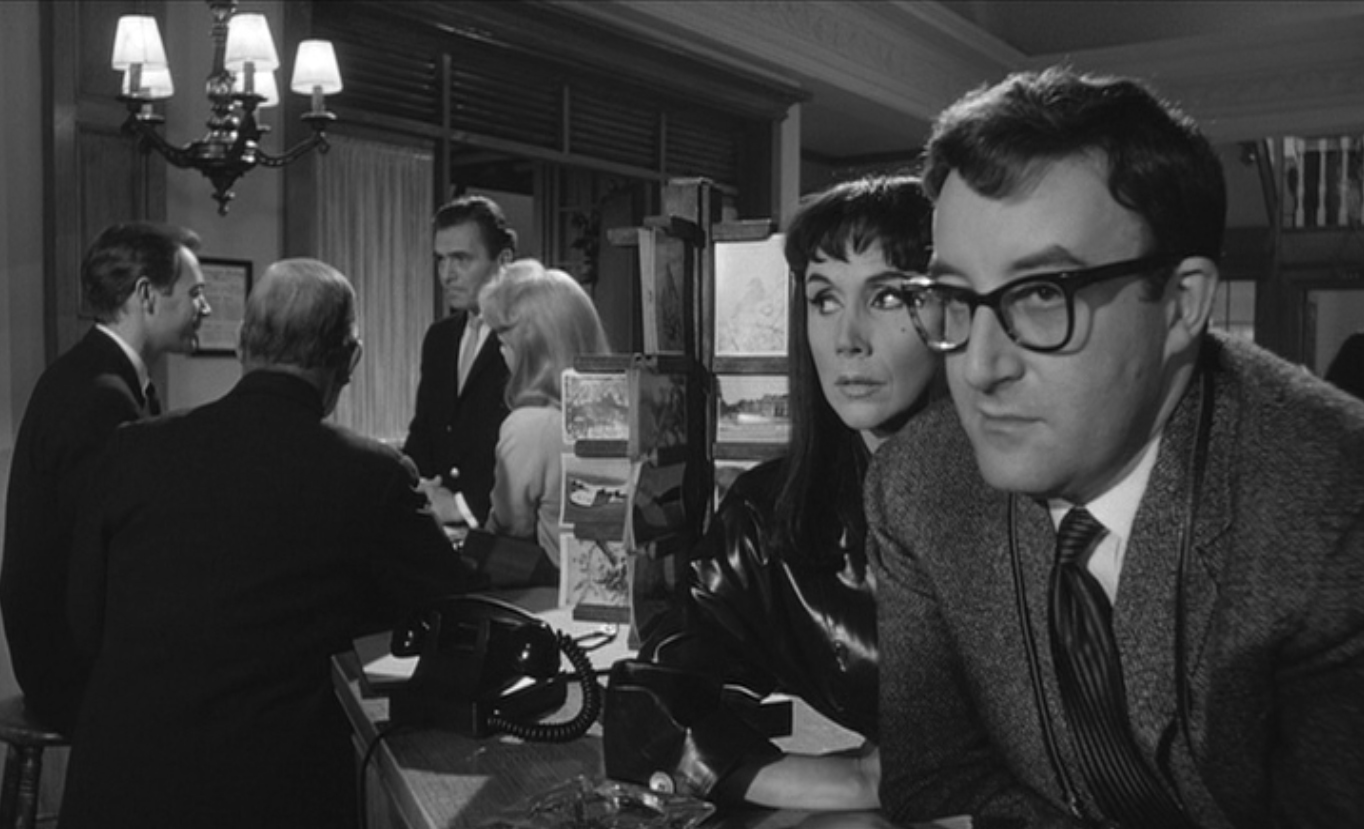
Go to TOC for this film ( (which has also a statement on purpose and manner of analysis and a disclaimer as to caveat emptor and my knowing anything authoritatively, which I do not, but I do try to not know earnestly, with some discretion, and considerable thought).
A NOTE ON THIS ANALYSIS. I COMPARE, SCENE BY SCENE, AT THE END OF EACH, KUBRICK'S FILM WITH NABOKOV'S SCREENPLAY. I HAVE ALSO UNDERLINED THAT DIALOGUE WHICH IS FROM THE NABOKOV SCREENPLAY BUT WHICH IS USUALLY PARAPHRASED. DIALOGUE IN THE FILM WHICH WAS IN THE BOOK, BUT NOT IN THE SCREENPLAY, MAY BE UNDERLINED BUT IS OFTEN INSTEAD OUTLINED IN THE COMPARISON SECTION OF EACH SCENE.
TOC and Supplemental Posts | Part 1 | Part 2 | Part 3 | Part 4 | Part 5 | Part 6 | Part 7 | Films Home
LINKS TO SECTIONS OF THE ANALYSIS ON THIS PAGE:
Camp Climax, Shots 265 through 270
Climax, Nabokov as Compared to Kubrick
The Butterflies as a Reference to Nabokov
Locations, Toll Gate and Ferry.
She Hasn't Been Feeling Very Well, Shots 271 through 286
Not Feeling Well, Comparing Nabokov with Kubrick
Briceland
Location, the Black Hills of South Dakota.
Kubrick's Deja Vu in Green Screens
Location of the Enchanted Hunters Hotel
The Enchanted Hunters Hotel, Shots 287 through 297
The Enchanted Hunters Hotel, Comparing Nabokov with Kubrick
Mr. Swine
The Enchanted
She'll Divorce You and Strangle Me, Shots 298 through 302
She'll Divorce You, Comparing Nabokov with Kubrick
Just Two Normal Guys Talking, Shots 303 through 319
Just Two Normal Guys, Comparing Nabokov with Kubrick
Slapstick with the Cot in Room 242, Shots 320 through 331
Slapstick, Comparing Nabokov with Kubrick
Why the Slapstick
Two Women and a Man Disguised as a Woman
The Game, Shots 332 through 334
The Game, Comparing Nabokov with Kubrick
Society's Absolution of Humbert
The Cot
Visually Tying in the Haze 242 Home with the Enchanted Hunters Hotel and Room 242
A Squashed Cat, Shots 335 through 340
A Squashed Cat, Comparing Nabokov to Kubrick
The Blarney Stone and Trips to the Underworld and an Anticipation of Lolita Keening for Charlotte
Gaslight Village Vows, Shots 341 through 344
Gaslight Village Vows, Comparing Nabokov to Kubrick
Why Gaslight Village
Weird Piedmont, South Dakota and Gaslight Village Coincidence
Is That a Tennis Ball?
265 LS Humbert's car on the highway. (1:09:45)
Crossfade to shot 266.
266 LS A toll booth. (1:09:51)
In shots 265 and 266 (and perhaps 267) you can make out two figures in the car, so it would seem these were shots intended for when Lolita is traveling with Humbert, but have ended in being used for Humbert traveling to pick up Lolita.
Crossfade to shot 267
267 LS A ferry. (1:09:55)
Crossfade to horseback riding at Camp Climax.
268 LS Camp Climax. Horseback riders. (1:10:03)
Crossfade to the camp office.
269 LS Camp Climax office. (1:10:06)
A number of girls lounge about. Several enter and the camera pans to follow them, finding Humbert standing with a tennis racket in hand in front of a stuffed animal. He raps it a couple times. IMDB states this is a stuffed beaver and it's a sexual joke, but the animal seems to me to be instead an otter, more likely a weasel. Beaver heads are rounder and their bodies are fatter, and a taxidermist would have shown its distinctive teeth. Otters have flatter heads, like this one. But this to me looks much like a weasel, and I would be inclined to believe it's a weasel because of the tennis racket that Humbert holds. Let's return to the opening, Humbert and Quilty playing tennis, Quilty calling Humbert Captain in association with Captain Love (from the Enchanted Hunter Hotel), and my discussion of the relationship with "love" as a zero score in tennis, the story being that "love" was a corruption of l'oeuf, French for egg, the egg representing a zero by resemblance. Then when Lolita visits Humbert's room with the breakfast tray, he eagerly devours an egg she gives him when he promises not to give away any of her secrets, Lolita having been unwilling to tell him something about Mona (who's been attending Camp Climax since she was ten) that was likely sexual. Weasel as a verb is related to the idea of weasels sucking the contents out of eggs, leaving the shell intact (from the Online Etymology Dictionary), as in weasel words deprive a word or phrase of its meaning. The weasel then is actually Charlie. For after seeing the taxidermy, Humbert meets the boy, Charlie, and is suspicious of him living at Camp Climax. Lolita later reveals she played a fun game with Charlie at camp, and then when Humbert says he didn't play it when he was a kid, the suggestion is that she proposes they play it. Charlie, to Humbert, is the weasel.
There's no reason for Kubrick to put in a joke about a beaver. So, Humbert is surrounded by girls. But what Humbert is concerned about is Charlie.
270 MS Charlie entering the Camp Climax office with white sheets. (1:10:20)
HUMBERT: Do you work here?
CHARLIE: Yeah, sort of.
HUMBERT: I didn't think you were a camper.
CHARLIE: No.
HUMBERT: This is a girl's camp exclusively, isn't it?
CHARLIE: Oh, yeah, yeah. I'm Charlie, Mrs. Sedgewick's son.
HUMBERT: Oh, you visit the place, I suppose, from time to time.
CHARLIE: No, I live here.
HUMBERT: Oh, are you the only boy living at the camp?
CHARLIE: The only one.
HUMBERT: Do you know a girl called Lolita? Delores Haze?
CHARLIE: Oh, yeah, yeah, I know her.
HUMBERT: Well?
CHARLIE: Well, I see her around once and a while.
HUMBERT: Oh.
CHARLIE: Hi, mom.
MRS. SEDGEWICK: Charlie, what are those sheets doing there? You know they belong in the laundry room. She's almost packed up, Mr. Humbert. We haven't told her anything.
HUMBERT: Of course.
MRS. SEDGEWICK: Poor man. Terrible thing.
Shot 265 | Shot 266 |
 | 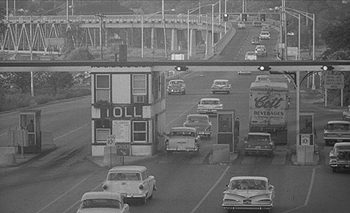 |
Shot 267 | Shot 268 |
 | 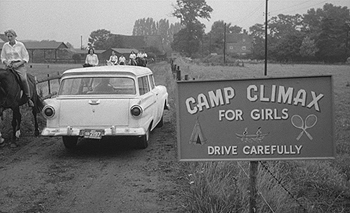 |
Shot 269 | Shot 270 |
 |  |
In Nabokov's screenplay, Humbert picks Lolita up at camp, but there is no tennis racket or ogling the girls, he doesn't meet Charlie except to ask him where the camp office is and there is no querying him about whether he is the only male there and if he knows Lolita. He has a brief conversation with the Camp Mistress who says "Poor Lolita" instead of "Poor man."
The camp, in the book and screenplay, is also called Camp Q, connecting with Quilty known as Cue. It is at Lake Climax.
There is no Sedgewick in either the book or the screenplay.
On the wall we see a butterfly collection. Nabokov was an avid butterfly collector and this is likely a reference to Nabokov.
Butterflies make a couple of appearances in the screenplay. At one time Humbert and Lolita go to the top of a mountain to a place where "tourists take pictures and feed the marmots". The roads are described as "serpentine" and the car "snakes" its way up them. Eventually, the car stalls at a steep incline. "The radiator grill is plastered with dead butterflies." The next scene is a canyon where they have attempted to take a short cut and become lost. Lolita suggests they stop and ask the "nut with the net" for directions. He's a butterfly hunter, and Nabokov had envisioned himself as making a cameo appearance as the hunter. Humbert asks if he could tell him if the road leads to Dympleton, but Nabokov says he hasn't the foggiest idea and suggests he talk to some loggers further on. I suspect that Nabokov was referring, with Dym, to the dim-mid formula laid out during the reading of Poe scene, "foggiest" seeming to echo the "misty mid regions". The twists and turns Humbert said were found in the dim-mid word play can be seen in the serpentine roads up which the car snakes.
An article by Michael Pyle gives this on Nabokov's butterflies:
...I'll hear ill-informed comments likening Nabokov's affinity for Lepidoptera with some sick tangency of female exploitation...Still others settle for cheap shots about his fixation on butterfly genitalia--for example this egregious idiocy from a draft manuscript for a national magazine, which I was asked to read and was fortunately able to derail: '[Butterflies] are sexy, too. Besides their beauty, the insects' mating habits seem to hold a strong fascination for aficionados. Nabokov, author of Lolits and other best sellers, was proud of his collection of Lycaenid [sic] male genitalia, which he kept, coated in glycerin and meticulously labeled, in vials in his office.' As if his attention to butterfly genitalia had anything prurient about it!
An old story has Nabokov working on specimen preparations at Harvard, when he is called away to conduct visiting alumni around the museum. With his genitalic preps sitting in potassium hydroxide, he grows impatient and says, "Excuse me, I must go play with my genitalia." One can almost imagine him making such a crack out of sheer, punning irreverence.
Nabokov did make a crack about the genitalia, and it was in the book, Lolita. Quilty was attempting to convince Humbert to allow him to live, telling him how he can live in the house, etc. And he offers this incentive:
Oh, another thing--you are going to like this. I have an absolutely unique collection of erotica upstairs. Just to mention one item: the in folio de-luxe Baration Island by the explorer and psychoanalyst Melanie Weiss, a remarkable lady, a remarkable work--drop that gun--with photographs of eight hundred and something male organs she examined and measured in 1932 on Bagration, in the Bar da Sea, very illuminating graphs, plotted with love under pleasant skies--drop that gun--and moreover I can arrange for you to attend executions...
Nabokov staged his vacations and his writing of Lolita around the hunting and collecting (killing) of butterflies. He was a hunter, just as he represents himself in the screenplay.
The Butterfly Hunter. His name is Vladimir Nabokov. A fritillary settles with outspread wings on a tall flower. Nabokov snaps it up with a sweep of his net. Humbert walks toward him. With a nip of finger and thumb through a fold of the marquisette Nabokov dispatches his capture and works the dead insect out of the netbag onto the palm of his hand.
The toll gate in shot 266 was that which used to lead to the Interstage Bridge between Kittery, ME and Portsmouth, NH. The below postcard is from an online archive of the Boston Library.
A post on my personally locating the toll gate, which wasn't yet identified online.
The ferry was the Jamestown Ferry Wharf at Newport, Rhode Island, which was in operation into the 1960s.
A post on my personally locating the ferry location, which wasn't yet identified online.
271 MCU Lolita in the car. (1:11:19)
LOLITA: Okay, what's the big mystery bit? Why'd those girls look at me so funny?
272 MCU Humbert and Lolita. (1:11:22)
HUMBERT: Oh, there's no mystery. It's just that I didn't want to talk in front of your friends at the camp. It's your mother.
LOLITA: Really? She giving me time off for good behavior or something?
HUMBERT: No, she hasn't been feeling very well.
LOLITA: What's the matter with her?
HUMBERT: She's sick.
273 MCU Lolita. (1:11:43)
LOLITA: Really? What is it?
HUMBERT (off screen): The doctors don't seem to know...
274 MCU Humbert. (1:11:46)
HUMBERT: ...quite what the trouble is. She's been moved to a hospital in the country, near Lepingsville.
275 MCU Lolita. (1:11:51)
LOLITA: A hospital. Is that where we're going now, to Lepingsville?
276 MCU Humbert. (1:11:55)
HUMBERT: Yes, eventually. And then, of course, you and I will have to bide our time until your mother gets well. And, after that, I thought we might go to the mountains...
277 MCU Lolita. (1:12:06)
HUMBERT (off screen): ...for a while. Does that appeal to you?
LOLITA: Well, what's the routine? Are we going home now or what?
278 MCU Humbert. (1:12:11)
HUMBERT: No, no dear. We should be in Briceland by dinner time and I have no doubt that we shall find some comfortable hotel...
279 MCU Lolita. (1:12:18)
HUMBERT (off screen): ...to uh spend the night and then tomorrow morning we'll press on towards Lepinsville. Did you have a marveous summer?
LOLITA: Yeah, I guess so.
HUMBERT (off screen): You sorry to leave?
LOLITA: Not exactly.
280 MCU Humbert. (1:12:36)
281 MCU Lolita. (1:12:40)
282 MCU Humbert. (1:12:44)
HUMBERT: You know I've missed you terribly.
283 MCU Lolita. (1:12:49)
LOLITA: I haven't missed you. In fact, I've been revoltingly unfaithful to you.
284 MCU Humbert. (1:12:54)
HUMBERT: Oh?
LOLITA (off screen): It doesn't matter a bit, because you stopped caring anyway.
HUMBERT: Oh, what makes you say I've stopped caring for you?
285 MCU Lolita. (1:13:03)
LOLITA: Well, you haven't even kissed me yet, have you?
286 LS the car from the rear. (1:13:06)
Shot 271 | Shot 272 |
 |  |
Shot 273 | Shot 274 |
 |  |
Shot 275 | Shot 276 |
 |  |
Shot 277 | Shot 278 |
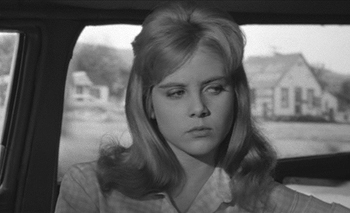 |  |
Shot 279 | Shot 280 |
 |  |
Shot 281 | Shot 282 |
 |  |
Shot 283 | Shot 284 |
 |  |
Shot 285 | Shot 286 |
 | 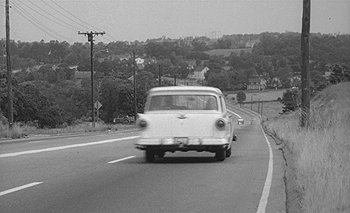 |
This scene is very similar to Nabokov's screenplay, though the dialogue is different. Nabokov had Humbert telling Lolita her mother had some abdominal trouble. Lolita asks if she can call him dad and talks about it being a surprise that he would fall for her mother, and that she doesn't buy it. Kubrick has entirely left this discussed move to father-daughter relationship out. The audience knows it, of course, that he is her stepfather, but giving voice to that would be something else.
Nabokov has Humbert driving too fast, and when Lolita says he hasn't kissed her yet, he pulls over, Lolita cuddles and they would kiss (as they do in the book) but a patrol car interrupts them and tells them to not park on the side of the road but at a picnic area ahead. Lolita talks a little about what she did at camp, saying she's filthy now in "thought, word, and deed" and hints at the game she will later propose, telling Humbert she has one thing she may tell him about later in the dark.
In the book, when Humbert pulls over to the side of the road, they are not interrupted by a police car before Lolita "flows" into his arms for a kiss. "I knew of course it was but an innocent game on her part." It's after they separate that the police car stops to ask if they'd seen a blue car of the same make as theirs.
It's at this point in the book that Lolita describes themselves as lovers. "Say, wouldn't mother be absolutely mad if she found out we were lovers?" And she promises to later tell him, in the dark, about "something I simply can't tell you without blushing all over".
Both Nabokov and Kubrick have Lolita as the flirty, childish aggressor here, taking out anger and resentment against her mother, while Humbert seems to the viewer to be the more passive--yet he is the one who, though her guardian, is kidnapping Lolita away from her home, denying Lolita knowledge of her real situation and of her mother's death so he can keep her calm as he puts miles between her and all that she has known in her young life, severing her from the past. If he had shown up and delivered the news that Charlotte was dead, it's likely a very different story would have unfolded. For Lolita, right now, is playing a vengeance game against her mother. She wants to get back at her mother, and if her mother were still alive and learned Humbert had any kind of sex with her daughter, then Humbert would have been booted out of the home, and Lolita knows that. Lolita, in her childish mind, probably also has the idea that then she and her mother would somehow return to their old life before Humbert. As the Lolita of the screenplay understands that Humbert wasn't in love with her mother and was instead after her, Lolita may be also wanting to get back at her mother out of feeling that her mother hadn't protected her and had used her as bait.
Why are they going to a place called Briceland? Because Brice, an anglicization of Bricius, is given as having been a Latinization of Mael Brigte ("tonsured devotee of St. Brigit") and Gilla Brigte ("deovotee of St. Brigit"). The name of the goddess Brigid is associated with "bride".
For a significant expansion on the below sections on location see the post Lolita Rear Screen Projection Location Shots 271-285 – Guess What, When They're on Their Way to the Enchanted Hunters Hotel in the White Mountains, They're in the Black Hills of South Dakota. I discuss how I was able to locate them as being in the Black Hills, where they are exactly, and have current images of places we see in the rear screen projections. I also discuss the reason why I think Kubrick located them instead in South Dakota, where a crew did travel as they shot also the car in South Dakota, in the Badlands. This is not stock footage.
With the exception of shot 286, rather than being in New England, the rear screen projections have them driving through the Black Hills of South Dakota.
There appears to have only been one Covered Wagon Resort, and it's on Sturgis Road, about an hour from the Badlands National Park, which is where Lolita and Humbert have their blow-out before she lands in the hospital with the Asiatic flu.
Kubrick, as far as I can tell, only gives us two potential give-away signs, during the trip scenes with Lolita, after he picks her up at camp, by which we may identify exactly where they are. This Covered Wagon sign is one.
Looking back over the scene and comparing it to the Black Hills area near the Covered Wagon, it really does seem this entire scene, exempting the last shot, may be filmed on Highway 14/Interstate 90 with the Black Hills mountains on the left screen.
The address for the Covered Wagon Resort is HC 80 Box 424, Piedmont, SD. Kubrick has been working with 242 and 24 and it may be here again with 424. Or it may be coincidence.
The Corrall Trailer Park, which I write of in the below section, was a Trailer Park located in Piedmont, SD as well. I've not found images of it but I have seen 1960s news ads for it. The current address is given as 2nd Street in Piedmont, South Dakota, which is 1.4 miles from the Covered Wagon Resort. This location is next to one of the buildings I've been able to identify in the footage, as discussed in the accompanying post above, that building being at Main Street and 2nd Street in Piedmont.
In shot 271 Lolita is saying, "Why'd those girls look at me so funny?" and we see the Corral sign just before the cut.
In the next shot, 272, we see a little footage just before the Corral sign, then the Corral sign repeats as Humbert says, "It's just that I didn't want to talk...", and the footage continues past the Corral sign showing some houses and old country stores.
In shot 276, as Humbert says "I thought we might go to the mountains..." we see a roof top ad just before the cut to Lolita.
The cut to Lolita in shot 277 shows the same ad only closer up, they are just passing it, Humbert finishing with asking if going to the mountains would appeal to her.
As Humbert speaks of finding a comfortable hotel, at the end of shot 278, we see a Miller sign in the background.
We see the same shot of the Miller sign at the end of shot 281, which is simply a reaction shot to shot 280. The cut comes before the sign passes to Lolita's screen right.
Kubrick does the same thing at points with rear screen projections in Eyes Wide Shut, such as with shots 141 and 143 in which we see twice a clock reading 1:22 as Bill takes a taxi to the Nathanson household after his argument with Alice. Kubrick also does a version of this in The Shining during the Gold Room party during which we will see a repeat of certain actors passing by behind Jack. And we also have this in 2001 in a few shots.
As far as I can tell this doesn't occur elsewhere in Lolita.
The location of the hotel has been identified at The Movie District. In the post, Identification of The Enchanted Hunters Hotel in 'Lolita' and an Optical Illusion, I explore some possible reasons that might have been behind this choice.
287 LS The Enchanted Hunters (1:13:11)
Now we crossfade to shot 287 with the road delivering the car straight to the door of the Enchanted Hunters Hotel just as the road delivers Jack and Wendy and Danny straight to the Overlook in The Shining.
The Enchanted Hunters Hotel shares a similar kind of timber framing style of architecture that Kubrick will make use of in A Clockwork Orange with the building, filmed at Edgwarebury, in which Alex is imprisoned after having been drugged by Alexander at his home. He awakens in a dormer room at this other place and, Beethoven being blasted in his ears, attempts to commit suicide by leaping from a third floor window. In both the book and screenplay, Nabokov had Humbert drugging Lolita at the Enchanted Hunters Hotel, which is omitted in the movie.
In my analysis of A Clockwork Orange I link Edgwarebury to Lolita. In the novel, something I'd formerly overlooked, Humbert elects to sign himself in as Edgar H. Humbert, taking as his first name his idol, Edgar Allen Poe who married a thirteen year old.
288 LS Vivian Darkbloom and Clare Quilty approaching the lodge's lobby desk. (1:13:14)
QUILTY: Hello, Mr. Swine.
SWINE: Hello, Mr. Quilty. Good evening, ma'am. Well, did you get any good pictures today?
QUILTY: Yeah. Great. I'm having a swell vacation.
289 MS Mr. Swine from Vivian's right. (1:13:26)
SWINE: Good.
QUILTY: Mr. Swine. Do you mind if I ask you a sorta personal question?
SWINE: Well, sure. Go ahead.
290 MS Quilty and Vivian from Swine's left. (1:13:31)
QUILTY: What is a guy like you doing in a job like this?
SWINE: What do you mean?
QUILTY: Well, you just don't seem to be the type.
SWINE (laughs): Well, as a matter of fact, I was an actor.
QUILTY: I knew it, I knew it. Didn't I say to you, when I first saw you there was something about you, a sort of aura that all actors and actresses have.
SWINE: Well, since you're a playwright, uh, maybe you, uh, could use me sometime.
QUILTY: Yeah, maybe I could use you. Sometime. Uh, Mr. Swine, what does an actor, manager do with his spare time in a small town like this?
As Swine says "playwright" he flips his pen and prods his hand gently with the clicker end of it, an action of which Quilty takes notice. The inference is perhaps Swine coming onto him.
291 MS Mr. Swine from Vivian's right. (1:14:07)
SWINE: Well, I don't have much time but, oh, I swim, play tennis, lift weights. Gets rid of the excess energy. What do you do...
292 MS Quilty and Vivian from Swine's left. (1:14:17)
SWINE: ...with your excess energy?
QUILTY: Well, we do alot of things with my excess energy. I'll tell you one of the things we do alot of, that's judo. Did you ever hear about that?
SWINE: Judo, yes, I've heard about it.
QUILTY: Yeah, yeah, yeah.
SWINE: You do judo with the lady...
QUILTY: Yeah, she's uh, she's a yellow belt. I'm a green belt. That's the way nature made it. What happens is she throws me all over the place.
SWINE: She throws you all over the place?
QUILTY: Yes, she does, she gets me in a sort of thing called a sweeping ankle throw. She sweeps my ankles away from under me, I go down with one hell of a bang.
SWINE: Doesn't it hurt?
QUILTY: Well, I sorta lay there in pain but I love it, I really love it. I lay there hovering between consciousness and unconsciousness. It's really the greatest.
Shot 289 | Shot 290 |
 | 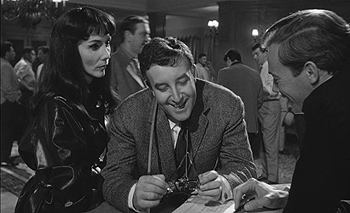 |
Shot 291 | Shot 292 |
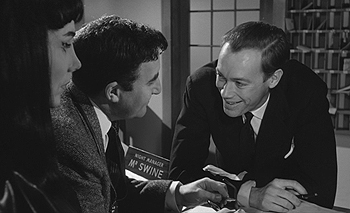 | 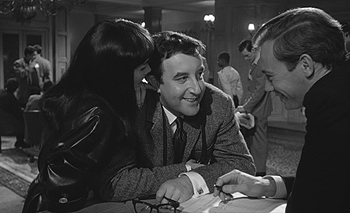 |
Shot 293 | |
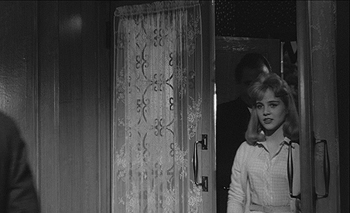 | |
293 Humbert and Lolita enter. (1:14:56)
LOLITA: Wow. This looks swank.
294 Vivian and Quilty with Humbert and Lolita beyond. (1:15:03)
QUILTY: See you later.
SWINE: Okay.
As Lolita and Humbert approach the desk, Vivian and Quilty move to the side.
HUMBERT: Good evening.
SWINE: Good evening, sir. Can I help you?
HUMBERT: Yes, I would like a room with a bath. Or, rather, two rooms with baths.
SWINE: Did you have a reservation, Mr...?
HUMBERT: Humbert, Humbert is the name. No, I have no reservations.
SWINE: Oh, I'm afraid it will be impossible to accommodate you. This convention's got us tied up in knots.
HUMBERT: Oh.
SWINE: Is it just you and the girl?
HUMBERT: Yes, I would like you to accommodate us because we're very tired.
SWINE: Oh, Mr. Potts.
POTTS: Yes, Mr. Swine.
SWINE: What about Captain Love, has he called?
POTTS: Oh, he's cancelled his reservation.
SWINE: Well I could give you 242. It's a lovely room, but...
295 MCU Quilty and Vivian with Humbert and Lolita beyond. (1:15:44)
SWINE: ...it's only got one bed.
HUMBERT: Well, perhaps you could find a folding bed or camp bed.
SWINE: Potts, do we have any cots?
POTTS: No. The troopers have snapped them all up.
296 MS Humbert and Lolita with Quilty and Vivian at the end of the desk. (1:15:52)
SWINE: Well, I'm sure you'd find one room satisfactory. Our double beds are really triple. One night we had three ladies sleeping in one.
HUMBERT: I'm sure we'll manage, even if my wife joins me later, we'll manage even then I'm sure.
SWINE: Would you mind registering? (Hands a pen to Humbert.)
HUMBERT: By the way, what sort of a convention are you holding here?
SWINE: We're very proud to have the overflow of the State Police Convention.
297 MCU Humbert. (1:16:19)
HUMBERT: Oh.
Shot 296 | Shot 297 |
 |  |
The Hotel having the overflow of the State Police Convention is not only a matter of comedy but it links back with Charlotte's death scene and the presence of the State Patrol Car. It's very possible that one of the State Patrolmen who was present at the scene of Charlotte's accident could also turn up here and recognize Humbert who goes around passing his wife off as ill.
In the screenplay, Humbert has made reservations elsewhere and it is Lolita who sees the Enchanted Hunters Hotel and insists upon staying at it. Quilty and Vivian are not there when they arrive and so they have no discussion with George Swine. In the screenplay, Potts was the night clerk and he is the one who has the dialogue with Humbert that is here given to Swine. There is an assistant named Swoon that Potts calls over to query as Swine queries Potts here. Lolita notes that the room number is 342, the same as their house number. Here the room number is 242, the same as their house number, but the coincidence goes without mention.
Rather than a State Police convention there is a physicans convention and a flower convention in the screenplay. A Dr. Love had cancelled his reservation, becoming Captain Love here, and is the reason for which Quilty initially addresses Humbert as "Captain" at his home at the movie's beginning, Humbert having taken the room Captain Love had cancelled.
In the book, Humbert had been planning to stay at the Enchanted Hunters Hotel, which Lolita declares to be "swank". Rather than being a young actor, a pink, old, clerk by the name of Swine handles them, and asks Potts if there any cots, who replies, "Our double beds are really triple. One crowded night we had three ladies and a child like yours sleep together. I believe one of the ladies was a disguised man..." Swoon was the name of the people who had taken the cot.
The martial art of Judo (the gentle way) is nowhere mentioned in either the book or the screenplay In section two, I discuss at this link the possible significance of Judo in relation to the Japanese concept of Ma.
At the Summer Dance, Quilty said of Lolita's name, "...that's right. Lolita, diminutive of Dolores, the tears and the roses".
There's a famous poem called "Dolores (Notre-Dame des Sept Douleurs)" by an Algernon Charles Swinburne, in which Dolores is referred to again and again as Our Lady of Pain. For Dolores means "sorrows" in Spanish, and is associated with the Virgin Mary--Maria de los Dolores.
Nabokov would have known of this poem in which Dolores is given as the daughter of Death and Priapus, perhaps Kubrick as well. Swinburne also wrote the poem Hermaphroditus and it may be that Nabokov had Swine as the night clerk as he is speaking about the possibility of a man disguised as a lady.
Not to mention that Vivian Darkbloom, the alter of Nabokov, is present.
I have extracted the below, rewritten it, and included it in a post on The Problems with Discussing Lolita.
I've cribbed the below directly from Wikipedia rather than paraphrase:
In 1939 Nabokov wrote a novella, Volshebnik, that was published only posthumously in 1986 in English translation as The Enchanter. It bears many similarities to Lolita, but also has significant differences: It takes place in Central Europe, and the protagonist is unable to consummate his passion with his stepdaughter, leading to his suicide. The theme of ephebophilia was already touched on by Nabokov in his short story "A Nursery Tale", written in 1926. Also, in the 1932 Laughter in the Dark, Margot Peters is 16 and already had an affair when middle-aged Albinus becomes attracted to her.
In chapter three of the novel The Gift (written in Russian in 1935–1937) the similar gist of Lolita's first chapter is outlined to the protagonist, Fyodor Cherdyntsev, by his obnoxious landlord Shchyogolev as an idea of a novel he would write "if I only had the time": a man marries a widow only to gain access to her young daughter, who resists all his passes. Shchyogolev says it happened "in reality" to a friend of his; it is made clear to the reader that it concerns himself and his stepdaughter Zina (15 at the time of Shchyogolev's marriage to her mother) who becomes the love of Fyodor's life.
In April 1947, Nabokov wrote to Edmund Wilson: "I am writing ... a short novel about a man who liked little girls—and it's going to be called The Kingdom by the Sea...." The work expanded into Lolita during the next eight years. Nabokov used the title A Kingdom by the Sea in his 1974 pseudo-autobiographical novel Look at the Harlequins! for a Lolita-like book written by the narrator who, in addition, travels with his teenage daughter Bel from motel to motel after the death of her mother; later, his fourth wife is Bel's look-alike and shares her birthday.
The unfinished novel The Original of Laura, published posthumously, features the character Hubert H. Hubert, an older man preying upon then-child protagonist, Flora. Unlike those of Humbert Humbert in Lolita, Hubert's advances are unsuccessful.
Hubert H. Hubert is given as a "charmeur" in the novel.
The Enchanter is indeed very similar to Lolita. It opens as follows:
"How can I come to terms with myself?" he thought, when he did any thinking at all. "This cannot be lechery. Coarse carnality is omnivorous; the subtle kind presupposes eventual satiation. So what if I did have five or six normal affairs--how can one compare their insipid randomness with my unique flame? What is the answer? It certainly isn't like the arithmetic of Oriental debauchery, where the tenderness of the prey is inversely proportional to its age. Oh, no, to me it's not a degree of a generic whole, but something totally divorced from the generic, something that is not more valuable but invaluable. What is it then? Sickness, criminality?...I cannot even consider the thought of causing pain or provoking unforgettable revulsion. Nonsense--I'm no ravisher. The limitations I have established for my yearning, the masks I invent for it when, in real life, I conjure up an absolutely invisible method of sating my passion, have a providential sophistry. I am a pickpocket, not a burglar. Although, perhaps, on a circular island, with my little female Friday ... (it would not be a question of mere safety, but a license to grow savage--or is the circle a vicious one, with a palm tree at its center?).
"Knowing, rationally, that the Euphrates apricot is harmful only in canned form; that sin is inseparable from civic custom; that all hygienes have their hyenas; knowing, moreover, that this selfsame rationality is not averse to vulgarizing that to which it is otherwise denied access...I now discard all that and ascend to a higher plane.
"What if the way to true bliss is indeed through a still delicate membrane, before it has had time to harden, become overgrown, lose the fragrance and the shimmer through which one penetrates to the throbbing star of that bliss? Even within these limitations I proceed with a refined selectivity; I'm not attracted to every schoolgirl that comes along..."
The Euphrates apricot is in a note given as being thought to be the apple of Eden.
In the novel, The Enchanter, is a scene that recalls Humbert's plan to abuse Lolita while she is asleep, which does not work out as she awakes. Here it is below with the stepfather who tries explaining to a terrified stepdaugher that it is all a "game".
...he saw that she was fully awake and looking wild-eyed at his rearing nudity.
For an instant, in the hiatus of a syncope, he also saw how it appeared to her: some monstrosity, some ghastly disease--or else she already knew, or it was all of that together. She was looking and screaming, but the enchanter did not yet hear her screams; he was deafened by his own horror, kneeling, catching at the folds, snatching at the drawstring, trying to stop it, hide it, snapping with his oblique spasm, as senseless as pounding in place of music, senselessly discharging molten wax, too late to stop it or conceal it. How she rolled from the bed, how she was shrieking now, how the lamp scampered off in its red cowl, what a thundering came from outside the window, shattering, destroying the night, demolishing everything, everything..."Be quiet, it's nothing bad, it's just a kind of game, it happens sometimes, just be quiet," he implored, middle-aged and sweaty, covering himself with a raincoat he had glimpsed in passing, shuddering, donning it, missing the armhole.
Below is a passage from Look at the Harlequins!:
As late as the start of the 1954-1955 school year, with Bel nearing her thirteenth birthday, I was still deliriously happy, still seeing nothing wrong or dangerous, or absurd or downright cretinous, in the relationship between my daughter and me. Save for a few insignificant lapses--a few hot drops of overflowing tendeness, a gasp masked by a cough and that sort of stuff--my relations with her remained essentially innocent.
And then this, on his last seeing Bel.
I never once--never once, reader!--looked up at my Bel, but as we were about to part (forever) I did look at her, and she had new twin lines from nostrils to wicks, and she wore granny glasses, and a middle part, and had lost all her pubescent prettiness, remnants of which I had still glimpsed during a visit to Larive a spring and winter ago. They had to be back at half-past-twenty, alas--not really "alas."
"Come and see us at Quirn soon, soon, Dolly," I said, as we all stood on the sidewalk with mountains outlined in solid black against an aquamarine sky, and choughs jacking harshly, flying in flocks to roost, away, away.
I cannot explain the slip, but it angered Bel more than anything had ever angered her any time.
"What is he saying?" she cried, looking in turn at Louise, at her beau, and again at Louise. "What does he mean? Why does he call me 'Dolly'? Who is she for God's sake? Why, why (turning to me), why did you say that?"
Dolly is apparently a nickname for a girl he had became infatuated with when she was only eleven, and with whom he had a brief affair when she was twenty-four.
Dolly walked in, smiling. Smiling, she indicated with a tilt of her chin that the receiver should be cradled. Smiling, she swept the examination books off the desk and perched upon it with her bare shins in my face. What might have promised the most refined ardors turned out to be the tritest scene in this memoir. I hastened to quench a thirst that had been burning a hole in the mixed metaphor of my life ever since I had fondled a quite different Dolly thirteen years earlier.
Dolly (Lolita's name is Delores) is described as having Lilithian eyes.
Nabokov wrote about Lolita many times in his life, just one of those books happened to strike a chord with the public and become famous.
298 MLS Humbert and Lolita being shown to their room by a bellhop. From the interior. (1:16:26)
HUMBERT: Perhaps if you just left them on the floor.
Despite Humbert's asking for the bags to be left on the floor, the bellhop places them on luggage racks at the end of the bed.
HUMBERT: Oh. Well, if you just....thank you very much. (Handing him a tip.)
BELLHOP: Well, thank you, sir.
The bellhop exits.
HUMBERT: Well.
LOLITA: Is this...it?
HUMBERT (nodding to the bed): You mean, uh...
LOLITA: Yeah.
HUMBERT: Well, yes.
Lolita sighs in disbelief, flopping on the bed.
HUMBERT: Well, I...I...I...I...I'm quite sure that they'll manage to find a cot for us. I asked them downstairs in the lobby to find a cot.
299 MCU Lolita on the bed, from Humbert's right. (1:17:25)
LOLITA: A cot.
HUMBERT: Yes.
LOLITA: You're crazy.
HUMBERT: Why, my darling?
LOLITA: Because, my darling, when my darling mother finds out, she's going to divorce you...
300 MS Lolita from the rear, Humbert beyond. (1:17:37)
LOLITA: ...and strangle me.
HUMBERT (taking her hands): Yes, now, look, now. I have a great feeling of tenderness for you. While your mother is ill, I'm responsible...
301 MCU Lolita on the bed, from Humbert's right. (1:17:52)
HUMBERT: ...for your welfare. We're not rich, and while we travel, we shall be obliged...we shall be thrown a good deal together.
302 MS Lolita from the rear, Humbert beyond. (1:18:00)
HUMBERT: Two people sharing one room inevitably enter into a kind of...
Lolita kicks off one shoe.
HUMBERT: How shall I say?
Lolita has kicked off the other shoe.
HUMBERT: Kind of an...uhm...
LOLITA: Aren't you going to go downstairs and see about the cot?
Crossfade to shot 303 as Lolita rises from the bed.
Shot 298 | Shot 299 |
 | 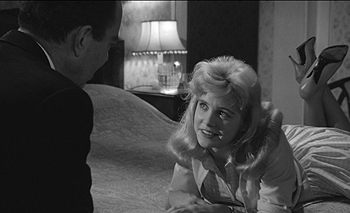 |
Shot 300 | Shot 301 |
 | 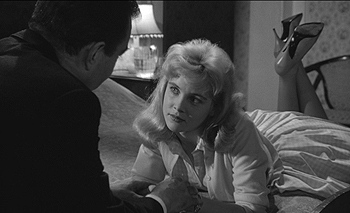 |
Shot 302 | |
 | |
The scene in the screenplay is much as it is here. Nabokov has Humbert reminding her he's her stepfather, is responsible for her welfare etc. Rather than Lolita kicking Humbert out by asking him to go down and check on the cot, Humbert attempts to kiss her and she rejects the kiss, saying she's had enough of the kissing game. She then excitedly looks at some clothes Humbert has purchased her. Flowers arrive for them which were not ordered by them. It's unknown who they are from but we can infer they were from Quilty.
In the book, the conversation is again much the same but Lolita now qualifies their relationship as "incest". Again, she interrupts a kissing game Humbert starts and examines the things he'd purchased her.
In both the screenplay and book, they go to eat in the dining room and Lolita sees a man who she says looks exactly like Quilty. Humbert gives her the sedative. She goes to bed and Humbert wanders the hotel while waiting for her to fall asleep, his plan being to rape her while she's unconscious.
303 Humbert with a drink in the lobby. (1:18:16)
He glances at his watch as a bellhop enters with other luggage. He strolls over to the desk in the lobby and as the camera follows him, Quilty and Vivian enter the frame, watching, Quilty holding a paper.
HUMBERT: Uh, has there been a message for me from my wife?
POTTS: I'm sorry, sir. Nothing yet. But we're working on that cot.
HUMBERT: Oh, thank you.
Humbert turns. Quilty raises the newspaper (comics page) to obscure himself and Vivian. Humbert exits through a rear door to the side of the desk.
304 Humbert on the rear porch. (1:18:56)
He glances at his watch then sits in a chair. We see Quilty approach from inside the lobby and exit the door onto the porch.
QUILTY: Hello. Hello.
HUMBERT: Oh, you're addressing me.
QUILTY: Yeah.
HUMBERT: I thought...
305 MCU Humbert. (1:19:22)
HUMBERT: ...perhaps there was someone with you.
QUILTY (off screen): No, not really, with some, I'm with you. I don't mean that as an insult.
306 MS Quilty from behind. (1:19:29)
QUILTY: What I really meant was I'm with the State Police here, and uh, when I'm with them I'm with someone, but...
307 MCU Humbert. (1:19:33)
QUILTY (off screen): ...right now I'm on my own. I mean I'm not with a lot of people, just you.
HUMBERT: Well, I wouldn't like to disturb you, I'll leave you alone if you preferred.
308 MS Quilty, Humbert beyond. (1:19:42)
QUILTY: No, you don't really have to go at all. I like it, you know, because I don't know what it is, I sort of get the impression that you want to leave but you don't like to leave because maybe you think I'd think you'd look suspicious, me being a policeman.
HUMBERT: Oh.
QUILTY: You don't have to think that because I haven't really got a suspicious mind at all. I look suspicious myself. A lot of people think I'm suspicious, especially when I stand around on street corners. One of our own boys picked me up the other week, he thought I looked too suspicious, standing around on street corner and everything.
309 MCU Humbert. (1:20:06)
QUILTY (off screen): Tell me something, uhm, I couldn't help noticing when you checked in tonight...
310 MS Quilty from the rear. (1:20:10)
QUILTY: ...It's part of my job, I notice human individuals. And I noticed your face.
311 MS Quilty, Humbert beyond. (1:20:15)
QUILTY: I said to myself when I saw you, I said there's a guy with the most normal looking face I ever saw in my life.
HUMBERT: That's very nice of you to say that.
QUILTY: Not a bit. Not a bit. It's great to see a normal face because I'm a normal guy. It would be great for two normal guys like us to get together and talk about world events, you know, in a normal sort of way.
HUMBERT: Well, there's nothing I'd like better than that, but I don't have much time.
QUILTY: Oh, it's a pity, because may I say one other thing to you that was really on my mind. I've been thinking about it quite a lot. I noticed when you was checking in you had a lovely, pretty, little girl with you. She was really lovely. As a matter of fact, she wasn't so little, come to think of it, she was fairly tall, I mean taller than little, you know what I mean. But, uh, she was really lovely. I wish I had a lovely, pretty, tall, lovely little girl like that, I mean...
HUMBERT: It's uh..that was my daughter.
QUILTY: Your daughter. Gee, isn't it great to have a lovely, little, tall, pretty, small daughter like that. That's really wonderful. I don't have any children. Boys or little tall girls or anything. I'm not even...are you married?
HUMBERT: Yes, I'm expecting my wife perhaps she's almost here.
QUILTY: May I say something? I thought you was looking a little uneasy at the desk there and maybe I was thinking that you want to get away from your wife for a little while. I don't blame you. If I...
312 MCU Humbert. (1:21:14)
QUILTY (off screen): ...was married I'd take every opportunity to get away from my wife.
HUMBERT: Yes. No, that was not it at all. As a matter of fact it's quite possible that my wife will not join me because when I left home she was not very well.
313 MS Quilty, Humbert beyond. (1:21:26)
QUILTY: Oh, gee, what's the matter with your wife?
HUMBERT: Well, it's nothing. Well, she had an accident.
QUILTY: Oh, geez, she had an accident. That's really terrible. I mean, fancy a fellow's wife having, a normal guy, his wife having an accident like that. What happened to her?
HUMBERT: She was hit by a car.
QUILTY: Gee, no wonder she's not here. Gee, you must feel pretty bad about that. When? What's happening? Is she coming later or something?
HUMBERT: Well, that was the understanding.
QUILTY: What, in an ambulance? Gee, I'm sorry, I shouldn't say that, I get sort of carried away, you know, being so normal and everything. Tell me, when you were standing there at the desk checking in with the night manager, Mr. George Swine, who I happen to know, is a personal friend of mine, uhm, I was wondering if, uh, he fixed you up with sort of good accommodations.
HUMBERT: Yes, they were extremely co-operative. (He glances at his watch.)
314 CU Quilty. (1:22:07)
QUILTY: You quite sure about that? Because, I mean I could really easily have a word with George Swine, I mean he's a really normal sort of nice sort of guy and I'm only going to have a normal word in his ear and you'd be surprised what things could happen from a thing like that. I mean he'd probably go and turn some of the troopers out so you could have a lovely room.
315 MCU Humbert. (1:22:21)
QUILTY (off screen): A bridal suite for you and your lovely little girl.
HUMBERT: No, please, I don't want you to take any trouble on my account. We're perfectly comfortable.
316 CU Quilty. (1:22:27)
QUILTY: But he should do it, it's his job to fix you up with something nice, I mean, you know he gets paid for doing that thing and I mean when he sees a guy like you coming in all normal and everything, with a lovely little girl beside him, he should say to himself gee I got to get that guy a lovely sort of comfortable foamy bed to sleep in. I mean, you know I just don't like to hear things like that happening because I could really go over and take a swipe at him for not giving you a lovely comfortable sleepy movie star bed. You know what I mean. I mean, you know, what has he got you on the floor or something?
317 MCU Humbert. (1:22:53)
HUMBERT: Well, the little girl is probably asleep already in the bed, and, well (laughs uncomfortably) I don't know why we're discussing this because...
318 CU Quilty. (1:23:00)
QUILTY: Listen, why don't you let me have a look at the accommodations that you have now and really take it in for a second. Then I can come down and have a word with George Swine. It would be so simple.
319 MS Quilty with Humbert beyond. (1:23:08)
HUMBERT: No, you really shouldn't worry about it...which reminds me I think that I should go upstairs.
QUILTY: You're going because maybe you think me being a policeman and everything I think that you're sort of suspicious. I don't think that at all. I think you're really normal and everything. You don't have to go because of that.
HUMBERT (rising): No, I, it's been very nice talking to you.
QUILTY: Listen, before you go, I was wondering in the morning maybe me being lonely and normal and everything...
HUMBERT: No, we shall have to get up at the crack of dawn...
QUILTY: Breakfast with me, perhaps, would you like that...
HUMBERT: That's very nice of you but...
QUILTY: I can arrange that with George Swine, the night manager, he could have it laid out all ready.
HUMBERT: Well, thank you so much. Good night.
QUILTY: You have a most interesting face. Good night.
Shot 304 | Shot 305 |
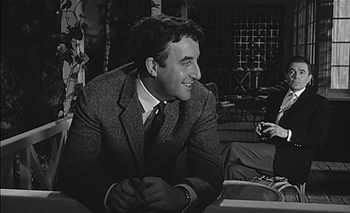 |  |
Shot 306 | Shot 307 |
 | 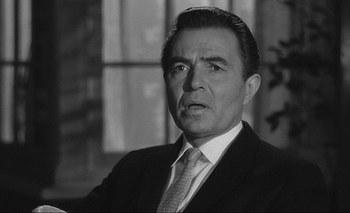 |
Shot 308 | Shot 309 |
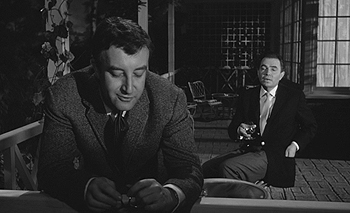 |  |
Shot 310 | Shot 311 |
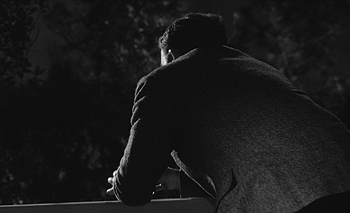 |  |
Shot 312 | Shot 313 |
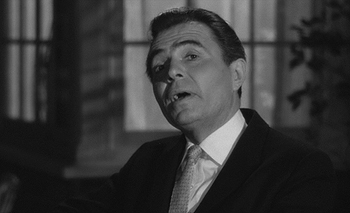 |  |
Shot 314 | Shot 315 |
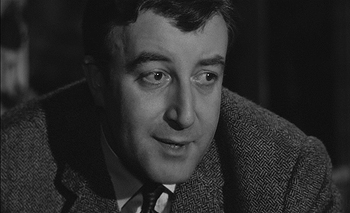 |  |
Shot 316 | Shot 317 |
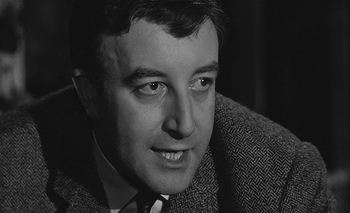 | 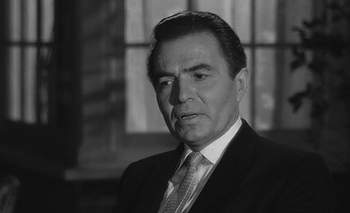 |
Shot 318 | Shot 319 |
 |  |
In both the book and screenplay, Humbert has a conversation with Quilty while waiting for the sedatives to work on Lolita.
In the screenplay the conversation is very different from this and much shorter, yet its essence is the same at the core, Quilty needling Humbert about the the girl he's with. In the screenplay Quilty does it by saying things outright, then when Humbert asks what he was saying Quilty changes it to something innocuous. Such as he asks "Where the devil did you get her?" and when Humbert replies, "Pardon", Quilty says instead, "I said: the weather is getting better".
Quilty does ask where Lolita's mother is and Humbert tells him she's dead. When Quilty proposes lunch together, Humbert says they will be gone by then.
The conversation with Quilty in the book is much as in the screenplay only even shorter, but a few lines. Quilty asks who the lassie with him is and what happened to the mother, will they lunch with him, and that's the end of it.
For all the time Kubrick gives Quilty/Peter Sellers in the film, he ends up being largely absent as an individual, as Quilty. Each of the interviews Humbert has with him will be frenetic and accusing. He is the wordy one. In the film, we haven't the benefit of knowing Humbert's interior process, though one of the points of the novel is, of course, that it's between the lines of Humbert's autobiography where one finds the truth. Despite his stated efforts to the contrary, Humbert attempts to convince the reader of his normalcy, and, moreover, his superiority. Nabokov, in his screenplay, had a great deal of narrative supplied by Humbert, and Kubrick nixed it. Conversationally as well, Humbert is left to reveal very little of himself in the film.
We have quite enough information, from the scene with the night manager, on Humbert's attempts to not draw negative attention to himself by appearing always as his interpretation of the sophisticated gentleman, but Kubrick has chosen to significantly amplify this aspect. Nabokov's choice, in the screenplay, was filling in timeline and salvaging, as best he could, Humbert's waxing poetic over Lolita in the novel, which didn't work very well and the screenplay was weak.
Even though we know Humbert's desperation to be anonymous, Kubrick's choice is to emphasize that anxiety through Humbert's shadow, Quilty, haranguing him about that mask of normalcy. If Kubrick had any reservations about the way Nabokov presented himself to the world (Nabokov and his wife, Vera, had tight control of his image) then I've wondered if there might be some needling of Nabokov in this section. By this, I don't mean to hint that Nabokov was a secret predator of young girls, only that Kubrick slipped some barbs into his films directed at Burgess and King and I don't think Nabokov entirely escaped some of the same treatment.
320 LS Humbert and 3 women leaving an elevator. (1;23:44)
We hear a knocking at a door.
HUMBERT (moving past the three women): Excuse me.
The three women enter room 239 where a party is taking place as Humbert runs to his door, a bellhop standing there with a cot, knocking. Humbert is as desperate as he is to keep anything from disturbing Lolita as in the book and screenplay his intention was to rape her well she was unconscious, sedated by drugs he had given her. Kubrick has left out Humbert's giving her a sleeping sedative at dinner.
HUMBERT: Hush, hush, shh shh shh. She's asleep.
BELLHOP: Oh. Good evening, sir. I brought the cot, sir.
HUMBERT: Yes, I see you did. We don't really need it now so take it away.
BELLHOP: You don't need the cot, sir?
HUMBERT: She's asleep, you see.
BELLHOP: I won't make noise.
HUMBERT: That's not the point exactly...
BELLHOP: I know but two of the troopers agreed to double up that's how I got the cot, sir.
HUMBERT: Well, in that case, all right, bring it in, but no noise. Quietly.
Humbert unlocks the door.
321 MS Lolita asleep on the bed, the door opening beyond. (1:24:12)
The bellhop enters with the cot.
322 LS From beyond the foot of the bed, the bellhop pushing the cot in front of the bed. (1:24:25)
An extended slapstick sequence of the bellhop unlocking the cot and attempting to push it open. He knocks over one of the suitcases which falls on Humbert's foot.
323 MS Lolita asleep. (1:25:03)
324 MLS The bellhop and Humbert work on the cot. (1:25:05)
They work on opening the creaky cot which snaps back on the bellhop.
325 LS From beyond the foot of the bed, the bellhop and Humbert working on the cot. (1:25:15)
They flatten it out somewhat and the bellhop falls on it, more suitcases falling. He takes off his jacket.
326 MS Humbert. (1:25:38)
327 LS Humbert and the bellhop. (1:25:38)
Humbert throws himself on the creaky cot, which flattens.
BELLHOP: We did it, sir.
HUMBERT: Shhhh!!
The bellhop begins to make up the sheets on the cot but Humbert waves him away. The bellhop retrieves his coat and slips it on. Humbert gives him a tip.
BELLHOP: Thank you, sir.
HUMBERT: Shhh!!
The bellhop exits.
328 MCU Lolita asleep. (1:26:17)
We hear the door close and lock. Crossfade to shot 329.
329 LS The bathroom door opening and Humbert exiting. (1:26:23)
He pauses and looks at Lolita, bending over her, then lifts the sheets to climb into bed.
330 MS Humbert climbing into bed. (1:26:58)
The bed creaks and Lolita rolls over, still sleeping. Humbert stops.
331 MLS Side view of Humbert paused, half kneeling on the bed. (1:27:12)
LOLITA (waking and sitting up): Hello. The cot came.
HUMBERT: Yes.
LOLITA: Well, good night.
She lies back down occupying the full bed. Humbert goes to the cot and lies down in it. The cot promptly collapses on the ground.
Shot 321 | Shot 322 |
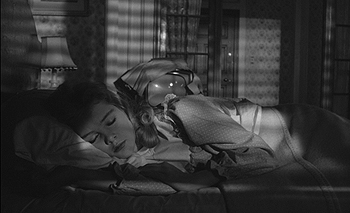 |  |
Shot 323 | Shot 324 |
 |  |
Shot 325 | Shot 326 |
 |  |
Shot 327 | Shot 328 |
 | 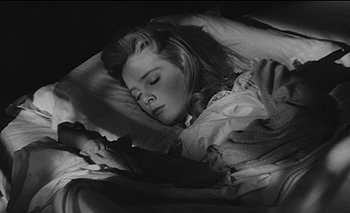 |
Shot 329 | Shot 330 |
 | 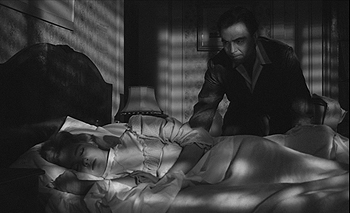 |
Shot 331 | |
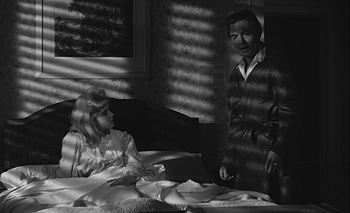 | |
The screenplay has the bellhop arriving with the cot and putting it in the room but there is no slapstick involved. Humbert is about to rape the drugged Lolita when he is stopped by the moon upon her innocent face. He goes to bed.
There is no cot scene with a bellhop in the book. Humbert attempts to approach Lolita in bed but she keeps being partially roused from sleep and he gives up. Humbert describes it all with the hope of proving he's not a "brutal scoundrel"...even though he gave her a sedative with the hope of raping her while she was unconscious.
I've the feeling that the slapstick, with a black bellhop, may have to do with a knowledgable service class knowing exactly what was up and subtly frustrating and antagonizing Humbert. Louise, the maid in the Haze household, is the one who Kubrick has interrupt Humbert laying upon Lolita's bed. This doesn't happen in the screenplay or the book, and puts Humbert in an intensely embarrassing position. The audience squirms, Louise walking right in and giving him Charlotte's letter. Humbert is a criminal predator, but still we squirm. We know that Louise knows. She has found Humbert in a compromising position. He should not be in Lolita's room lying on her bed.
We have the same with the bellhop. When the bellhop carries in the suitcases, Humbert does what he can to get the bellhop out quickly, but the bellhop doesn't listen and takes his little extra time in the room. Later in the evening, Humbert does what he can to stop the bellhop from knocking on the door and delivering the cot, but the bellhop persists. Humbert does what he can to get the bellhop out of the room, to not set up the cot, but the bellhop persists. He refuses to do as Humbert requests. It's funny, yes, but...
We take note of the three women in the hall because of Humbert having been told the beds were so roomy that three women had slept in one. In the book, one of the women is stated to have perhaps been a man disguised as a woman. Glancing through Look at the Harlequins!, I find Nabokov has referred again to this.
The delights of puberty granted me temporary relief...Two lewd young ladies rigged me up once in a lacy chemise and a Lorelei wig and laid me to sleep between them, "a shy little cousin," as in a ribald novella, while their husbands snored in the next room after the boar hunt.
Look at the Harlequins!, pseudo-autobiographical, was partly Nabokov's response to individuals who had questioned whether or not he had a secret interest in young girls. The two women and disguised male are significant enough to him, for some reason, that he resurrects them from Lolita and inserts them in the Harlequins book, this time confiding that one of the women was indeed an adolescent boy, supposedly himself.
The three women are significant enough to Kubrick that he has them departing the elevator with Humbert. They go up to what we presume would be their room, 239, a little down from room 242 and opposite it, but it seems not to be their room after all for, as the door opens, sounds of a party exit into the hall and a man's arm unfolds out the doorway and welcomes them in. Humbert is very conscious of all this, glancing and not glancing back at them, while he tries to turn down the cot.
332 MS Lolita asleep. (1:28:10)
She wakes up to the sound of the birds outside. Climbs out of bed and goes to kneel at the head of Humbert's cot.
LOLITA: Wake up, Humbert, the hotel's on fire.
HUMBERT: Huh?
LOLITA: The hotel's on fire. Quick!
333 MCU Lolita and Humbert. (1:28:45)
HUMBERT: What, what, what, it's on fire?
LOLITA: Yeah! Get out of bed real quick. It's burning right down to the ground.
HUMBERT: Oh, Lolita. Why'd you have to wake me? I only just got to sleep. Very funny.
LOLITA: By the way, what happened to your bed, it looks a lot lower.
HUMBERT: Well, the bed collapsed. It's a collapsible bed.
LOLITA (checking his watch): What time is it?
HUMBERT: It's breakfast time.
LOLITA: You know, my tan is much darker than yours now.
HUMBERT: That's not strictly true. You're a very fair-skinned lady.
He bends her double-jointed fingers back.
HUMBERT: Uh, look at that. That's very interesting.
LOLITA: Yeah.
HUMBERT: What else can you do?
LOLITA: Well, this little thumb can go all the way back to my wrist. See?
HUMBERT: Yes, I can see. You're very talented.
LOLITA (stroking his chin): Boy, you need a shave.
HUMBERT: Of course I need a shave because I've not shaved since yesterday morning and I'm a man who needs two shaves a day.
LOLITA: Uhm. Do you always have to shave twice a day?
HUMBERT: Yes, of course, because all the best people shave twice a day.
LOLITA: Well, what shall we do now?
HUMBERT: Well, you ring down and order breakfast.
LOLITA: No, I don't want to do that.
HUMBERT: Well, what do you want to do?
LOLITA: Why don't we play a game?
HUMBERT: A game? Oh, c'mon. No, you get onto room service at once.
LOLITA: No, really. I...I learned some real good games in camp. One in particularly was fun.
HUMBERT: Well, why don't you describe this one in particular game.
LOLITA (stroking his hair): Well, I played it with Charlie.
HUMBERT: Charlie. Who is he?
LOLITA: Charlie? He's that guy that you met in the office.
HUMBERT: You mean that boy?
LOLITA: Uh-hum.
HUMBERT: You and he?
LOLITA: Yeah. You sure you can't guess what game I'm talking about.
HUMBERT: No, I'm not a very good guesser.
LOLITA: Well (she whispers in his ear).
HUMBERT: I don't know what game you played.
LOLITA (whispering): You have to be completely () to play the game. (Then aloud.) You mean you never played that game when you were a kid.
HUMBERT: Uh, no.
334 CU Lolita. (1:31:38)
LOLITA: All righty then.
She pulls herself around next to Humbert and the screen fades to black.
Shot 332 | Shot 333 |
 |  |
Shot 334 | |
 | |
The scene in the screenplay is the same here as far as the bones. Kubrick has added the double-jointed games (fits in with Humbert's writing of the two-fold nature of Lolita) and the insistence at first that Lolita get breakfast. Lolita pretty much immediately suggests they play the game, whispering her description in his ear. Nabokov notes, "Her humid lips and sly slit eyes seem to anticipate and prompt an assent." So, Nabokov has her really pushing Humbert to play this game that she describes all the kids as playing. Humbert not being able to guess it, she asks him if she can show him the game, and Humbert says yes if it's not too dangerous.
In the book, when Lolita wakes in the morning, finding Humbert lying beside her in bed, she kisses him, tells him about the game with Charlie, and initiates it. "She saw the stark act merely as part of a youngster's furtive world, unknown to adults." Humbert stresses for the reader that he's not really concerned with sex at all, just with the magic of nymphets (which, of course, is a protestation that is countered by all his actions).
Later, in the book, with Lolita having initiated sex, Humbert is able to hold it over her head that there would be severe penalties for her, should she ever go to the police, for corrupting an adult and having generally loose morals. Humbert does allow to slip through periodically Lolita's insistence that he raped her at the hotel.
As Lolita appears to initiate sex, or what she calls "the game", Humbert is often liberated of responsibility, some individuals seing Lolita instead as a manipulative aggressor--and this despite Humbert's intentions and his lying to her. Nabokov has Lolita as the instigator but also clarifies she sees this as a child's game, and that she later describes herself as having been raped. It's interesting that this version of Lolita captured the public's attention, rather than the 1939 in which the stepdaughter leaps from the bed in horror, screaming, the predator being the one who insists it's all a game. Nabokov splits his book between the poetics of the obsession of supposed love and terse allowances of Lolita's slavery. Rewriting Lolita as the seeming aggressor, Nabokov spares the reader a rape scene, which he may have perceived as essential for the public if they were to stick around and read the remainder of the book, whereas his 1939 book ended with the attempted rape. Humbert certainly knows what game it is that Lolita is suggesting, and leads her on with his naivety. He deceives her into the aggressive position, but she is also desirous of exacting a kind of vengeance on her mother that would immediately mean having Humbert thrown out of their lives. She knows her mother would be jealous. She doesn't comprehend Humbert's criminality.
I keep looking back at Humbert as he goes through the toll booth and the Cott truck that we see, wondering if there's some anticipation of this scene there.
Quilty, in the book, is for some reason at first believed to be a private detective named Trapp. Trapp makes no appearance in the film and I've wondered if Trapp/Quilty may be alluded to via the pun of cot = caught.
The Haze home has 242 as its street number, and Humbert and Lolita stay in room 242 at the Enchanted Hunters Hotel. There are also some visual links.
When Humbert arrives in Ramsdale we have in shot 68 a purported visual of the fictional town.
Down in the right hand corner a single house of timber frame style construction is observed.
We see this same timber frame style of construction at the Enchanted Hunters Hotel in shot 287.
Here is a view of the Haze household in shot 71.
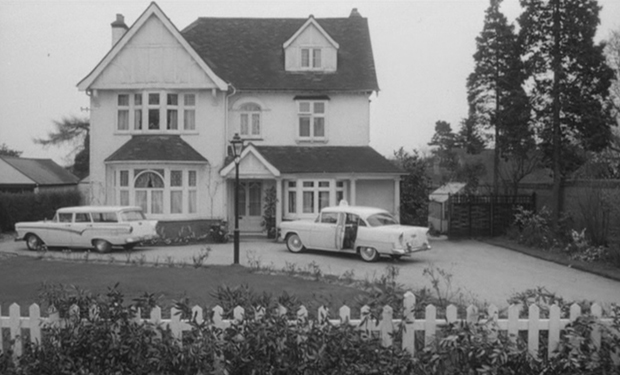
Below is the house that was used for the Haze household.
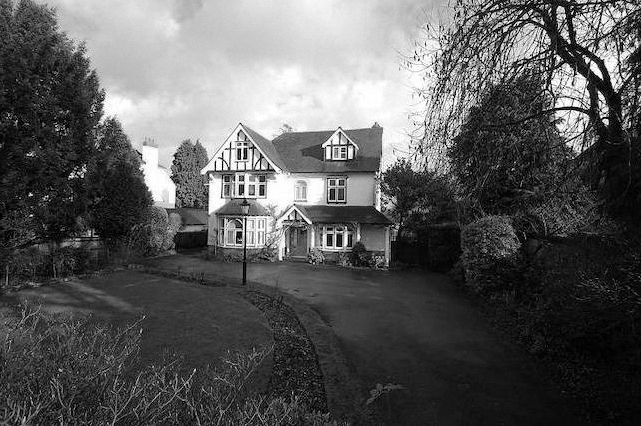
One will note that it is also timber frame construction. Indeed, the entire area is all houses done in the exposed timber frame style. My guess is that Kubrick likely had the house painted in order to obscure the visual timber frame link between the Haze home and the Hotel, so that this association wouldn't be too obvious, just as a big deal of the 242 is not made in the film.
As it happens there is also, I think, a link between the hotel room in which they stay and Charlotte's bedroom.
Below is the very conspicuously placed triptych of the the Virgin and Child below the photo of Harold Haze. Before it is the urn bearing his ashes.
In the hotel room there is a mirror triptych. This is an ordinary kind of furniture but it strikes me as intended to recall the Virgin and Child triptych in Charlotte's bedroom.
It also recalls something else. The screen bearing the image of the Mexican in the sombrero. It's difficult to say how many panels this screen would have. We pass by it several times as Charlotte shows Humbert about. Finally in shot 74, backing out of Charlotte's room, eager to get away from her, Humbert bumps into the screen. Charlotte apologizes and says that she has told Lolita ten times to keep it in her room. Later we see in Lolita's room, not the screen, but a small print showing the same image.
Charlotte and Harold had spent their honeymoon in Mexico. I think we can assume that they returned from Mexico with this screen and likely the sombrero and poncho that Lolita keeps in her room, hanging on the wall above the small print showing the same figure.
335 The station wagon on the road. Highway 9N. (1:31:51)
336 MS Lolita and Humbert. (1:31:59)
Lolita is drinking a soda and eating chips.
LOLITA: Have you ever kissed a blarney stone?
HUMBERT: No, that's something I never did.
LOLITA: Boy, I sure wish I could.
HUMBERT: Well, perhaps sometime we can organize a trip.
LOLITA: Hmmm. Hey, let's tell mother.
HUMBERT: Tell mother what?
LOLITA: You know what.
HUMBERT: No, I don't think that would be very funny.
LOLITA (laughing): I wonder what she'd do.
HUMBERT: If you don't stop eating those chips, you won't have any appetite for your lunch. (Takes a sip of her soda.)
LOLITA: Hmmm. Ooo, did you see that, a squashed cat. Boy that's terrible. I hate things like that. You know what I'd like for lunch?
HUMBERT: No, tell me.
LOLITA: A big plate of french fries and a malt.
HUMBERT: Oh.
LOLITA: Oh. How long until we get to Lepingsville?
HUMBERT: Well, I'm beginning to think that perhaps we won't make it this evening. We got off to rather a slow start, remember?
LOLITA: Can we go to a movie tonight?
HUMBERT: If that's what you'd like.
LOLITA: Mmm. I would. Have you ever seen any of those, you know, those foreign films?
HUMBERT: Yes, frequently.
LOLITA: I don't like 'em.
HUMBERT: Oh?
LOLITA: Uh-nuh. Will we stop at the next gas station?
HUMBERT: All right. You're feeling all right, aren't you?
LOLITA: Uh-huh. I feel fine. I want to call mother at that hospital. What's the number? Well, don't you know the number?
337 MCU Humbert. (1:34:04)
HUMBERT: I think it will be just as well if you wait until we get to Lepingsville.
LOLITA (off screen): Why? What difference does it make? I want to call her.
HUMBERT: I just don't think it would be a very good idea.
338 CU Lolita. (1:34:17)
LOLITA: Why can't I call my mother if I want to?
339 MCU Humbert. (1:34:21)
HUMBERT: Because you can't!
LOLITA (off screen): Why?
HUMBERT: Because...your mother is dead.
Shot 335 | Shot 336 |
 |  |
Shot 337 | Shot 338 |
 |  |
Shot 339 | Shot 340 |
 | 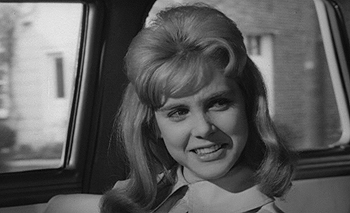 |
340 CU Lolita. (1:34:33)
LOLITA (laughing): Come on, now, cut it out. Why can't I call her?
HUMBERT (off screen): Your mother is dead.
Crossfade to shot 341.
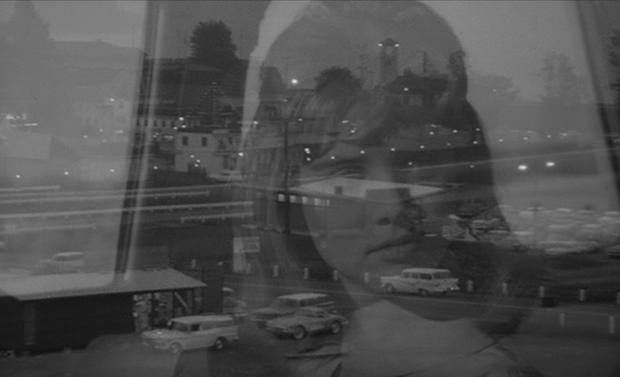
The crossfade from Lolita to shot 341 is supernaturally disturbing.
The conversation in the car with Humbert, during which Lolita learns of her mother's death, is much shorter both in the screenplay and in the book.
In the screenplay, there is no talk of blarney stones or organizing a trip to see one.
A squashed squirrel is seen, which here is instead a squashed cat, in keeping with Charlotte's relationship to felines observed in her attire.
There is no talk of going to movies or if Humbert has seen foreign films.
Lolita, in both the book and screenplay, says that she is uncomfortable, that she feels that Humbert tore something inside her. Squirming in her seat, she wishes to stop at a gas station. At the gas station, Lolita expresses a desire to call her mother, as in the movie, and Humbert becomes irritated with her insistence, finally telling her that her mother is dead.
In the book, despite Lolita saying she's been injured, Humbert is already trying to find a place again to have sex with her, she doing her best to refuse him and shrieking no. In both the book and screenplay she calls him a brute and says she ought to go to the police and tell them that he raped her. All of this is completely avoided in the movie. Instead, when Lolita says she wants to go to a gas station, Humbert asks her if she feels all right and she says she feels fine. The principle threat is that Lolita, in the movie, says that she thinks it would be great fun to tell her mother, wondering what she would do. There is no danger of this of course as her mother is dead, but the point is again made that Lolita's sexual relationship with Humbert has been all about a desire to upset her mother, which would have resulted in an expulsion of Humbert from their lives. Instead, Lolita learns he is now her only parent, her only family.
In place of Lolita being injured (perhaps because he felt mention of Lolita's profound discomfort would be too difficult for a dark comedy) what Kubrick appears to do is replace it with an immediate emphasis on the power differential in the relationship, and that Lolita is actually as a daughter to Humbert just as he is as a father to her. Her comprehensions are as a child. Her sense of the world and her priorities are those of a child. Humbert, despite being a criminal pedophile, is still the adult and relates to her as the father figure in how he dialogues and guides and manipulates situations and environment.
Why the Blarney Stone, which is neither mentioned in book nor screenplay? The origin story of the Stone is that Cormac Laidir MacCarthy, builder of Blarney Castle, sought Cliodhna for assistance in pleading his case in court. Cliodhna is said to have told him to kiss the first stone he came across on the way to court, and doing so he gained the gift of the blarney.
Here we have another tie in with Lilith, for Cliodhna is queen of the banshees, spirit messengers of the underworld whose wailing was an omen of death. Wikipedia states this came about through the practice of women keening at funerals, and that at great houses a bean shee, woman of the fairies, would also be present to keen.
Sometimes the keen is described as a sound of a woman's wail and the moan of an owl.
Lilith is also one who stands at the boundary of death and the otherworldly, the tales mostly involving death. She was represented as a night creature, sometimes an owl, and was called a howler. ILL (yalal) means to howl or wail...
...with "mourning for death and destruction in view" (HAW Theological Wordbook of the Old Testament—Joel 1:5, Micah 1:8).
Source
I'm looking in context of factors such as the Blarney Stone associated with the weeping banshee, with death, an entrance to the underworld etc. The eloquence of the blarney may remind of Orpheus whose singing was of such beauty that the rulers of the underworld gave him the opportunity to rescue his wife, Eurydice, from death. As long as he didn't turn back to look at her, as they made their return to the normal world, the world of the living, he could keep her. But he did turn back, and her shadow fled back into Hades. The wisdom is that he had to look back, and not only out of psychological need. One is simply incapable of not looking back, exempting the case of Lot and his daughters.
On the way to get Lolita, Humbert passes through a toll booth, and then we have him taking a ferry. We have no mention of the ferry in the book or screenplay. Certainly, just another symbol of travel, but in myth ferries are common porters of the dead to the underworld.
The entirety of The Shining and Bill's trip to Somerton, in Eyes Wide Shut, occur in underworld places, as I write of in my Eyes Wide Shut analysis.
Bill is in an area of New York where we don't have the walls of evergreens into which his taxi is shown as entering after it passes (what I was able to identify as) the Oyster Bay funeral home on the way to Somerton. After the funeral home is when the transition of greenery takes place from deciduous to the evergreens.
A crossfade takes from the funeral home to the evergreens above, but the building long lingers, as can be seen with a little brightening. Its columns at one point blend with the trunks of the trees.
This trip to Somerton is prefigured in a small evergreen at the end of the waiting room desk at Bill's office.
Where else do we see this winding? In the winding road that takes Jack up through the evergreens to the Overlook.
Somerton is the home of the Troy maze in England. The Overlook, too, was the home of a maze.
I'm not so concerned with the maze here. What is important is we have the characters in all these stories enter into a kind of otherworldly realm, the forests of the Overlook and Somerton repeating the Enchanted forest entered by Humbert in the company of Lolita.
Back to the idea of Lilith the howler and the wailing banshee connected with the Blarney Stone, our next scene is of Humbert tormented by Lolita's crying. Of course, this makes perfect sense that Lolita would be mourning her mother and her situation, but it also plays into the idea of the howling Lilith and the wailing banshee.
341 LS The wagon on the road. (1:34:48)
The wagon passes a boat shaped restaurant approaching Gaslight Village. Crossfade to shot 342.
342 LS Motel in Gaslight Village. (1:34:54)
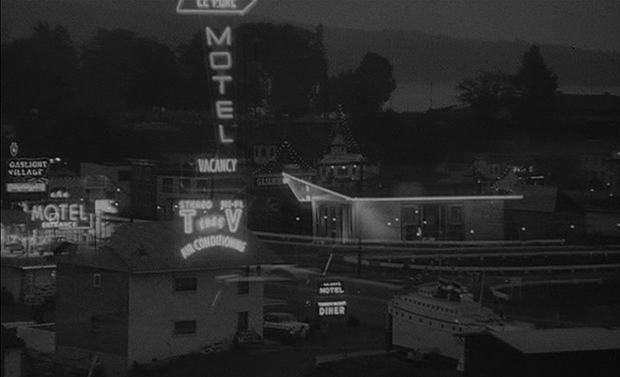
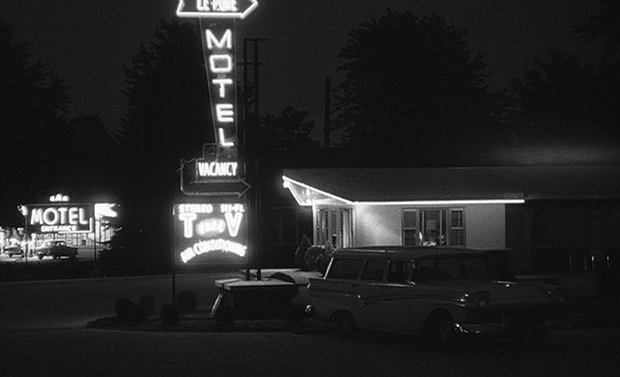
343 LS Humbert in bed, listening to Lolita cry in another room. (1:35:01)
The camera zooms in on him and he eventually sits up and on the end of the bed.
344 LS Lolita in an adjoining room. (1:35:41)
She rises and crosses through the bathroom to Humbert's room where she lies down on the bed beside him.
HUMBERT: Try to stop crying. Everything's going to be all right.
LOLITA: Nothing will ever be all right.
HUMBERT: I'm sure that we're going to be very happy, you and I.
LOLITA: But everything has changed all of a sudden. Everything was so...I don't know...normal.
HUMBERT: Lolita. Please, please, stop crying. We'll we'll we'll do things. We'll go places.
LOLITA: But there's no place to go back to.
HUMBERT: We'll find a new home.
LOLITA: Where?
HUMBERT: Beardsley. My lectureship starts in September. It's it's in Ohio. You'll like it there.
LOLITA: I'll hate it. I know I will.
HUMBERT: No, you won't. It's a wonderful place.
LOLITA: But what about all my things back in Ramsdale? And the house?
HUMBERT: We'll take care of all those things. What things...what things do you want especially?
LOLITA: My record player and my records.
HUMBERT: We'll send for them but in the meantime I can buy you new ones to take the place of the old ones. I'll buy you the best hi-fi set that you ever saw. And all the new records. O. There, there.
LOLITA: We can't stay in Beardsley forever. Where's that handkerchief?
HUMBERT (takes out a handkerchief and gives it to her): Here.
LOLITA (blowing her nose): Promise me something.
HUMBERT: Yes, anything.
LOLITA: Promise you'll never leave me. I don't ever want to be in one of those horrible places for juvenile delinquents.
HUMBERT: Whatever makes you think that that would happen to you?
LOLITA: I know it would. And, anyway, I'd rather be with you. You're a lot better than one of those places. You will promise, won't you?
HUMBERT: Yes, I promise.
LOLITA: Cross your heart and hope to die.
HUMBERT: Cross my heart and hope to die. Cross my heart and hope to die. Cross my heart and hope to die.
Fade to black.
Shot 343 | Shot 344 |
 | 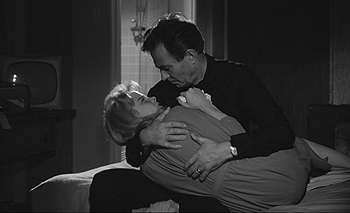 |
This scene scarcely figures in the book. Humbert purchases things to appease Lolita. She cries and cries at night. Though they've separate rooms, Lolita goes to his as she has nowhere else to go. There is no dialogue.
In the screenplay, the scene is different in that Humbert is instead the one who tells Lolita he would not withstand it if she ever left him, and she replies that she wouldn't as she has no place else to go.
Kubrick has Humbert comforting Lolita and asking her whatever gives her the idea she might end up in a facility for juvenile delinquents. In the book, Humbert is the one who threatens with Lolita this, telling her if she goes to the authorities or lets anyone know about them she would get in trouble for corrupting the morals of an adult and for having lost her virginity before her association with him. He warns her she would lose her freedom and be placed in a home for juvenile delinquents.
Because we see the Gaslight Village sign we're able to tell that this motel belonged to the Gaslight Village theme park in the Adirondacks. Wikipedia states "The park was located along New York State Route 9N, U.S. Route 9 and Warren County Route 69 (West Brook Road) in the village." I read that it was a theme park that harked back to the 1890s and was more popular with adults than with children.
Gaslight Village apparently was composed of Storytown (nursery rhymes come to life), Ghost Town ("exciting shows and outlaw action of the 1800s") and Jungle Land.
But why Gaslight Village, which appears neither in the screenplay nor in the book? Why show this motel's name?
I don't know when the term "gaslighting" became popular, but its origin is the 1938 film, "Gas Light", in which a man manipulates his wife's environment, leading her to think she's losing her mind.
From Wikipedia:
Gaslighting or gas-lighting is a form of mental abuse in which false information is presented with the intent of making victims doubt their own memory, perception, and sanity. Instances may range simply from the denial by an abuser that previous abusive incidents ever occurred, up to the staging of bizarre events by the abuser with the intention of disorienting the victim.
Humbert tried gaslighting Charlotte when he told her, with her discovery of the diary, that she was hallucinating, crazy. Lolita will later try he same with Humbert, obviously having learned well from him.
I've already discussed how in the rear screen projections on the way to the Enchanted Hunters Hotel Lolita and Humbert are in the Black Hills, specifically in and outside the very small town of Piedmont, South Dakota. See post Lolita Green Screen Location Shots 271-285 – Guess What, When They're on Their Way to the Enchanted Hunters Hotel in the White Mountains, They're in the Black Hills of South Dakota.
Below is a capture from the film of a building at Main Street and 2nd Street in Piedmont, seen to screen left of Lolita's head, and below it is a Google Maps screengrab of that same building today.
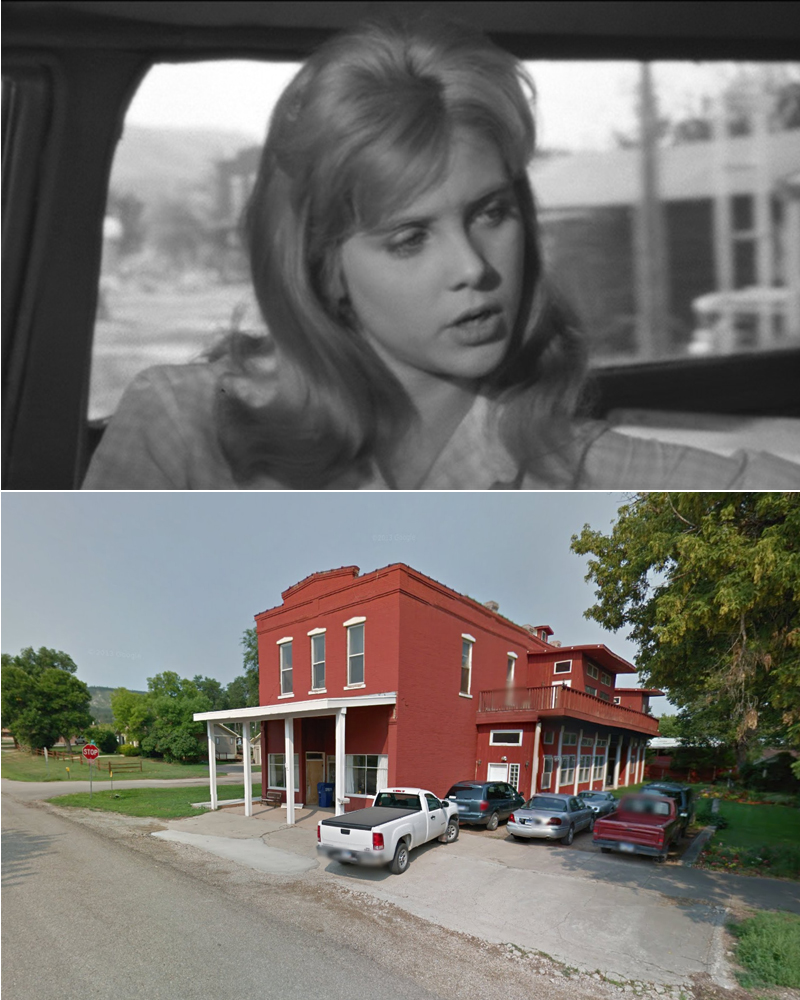
After staying at the Enchanted Hunters Hotel, Humbert and Lolita head to Gaslight Village. Below is a postcard of Gaslight Village circa 1960s.
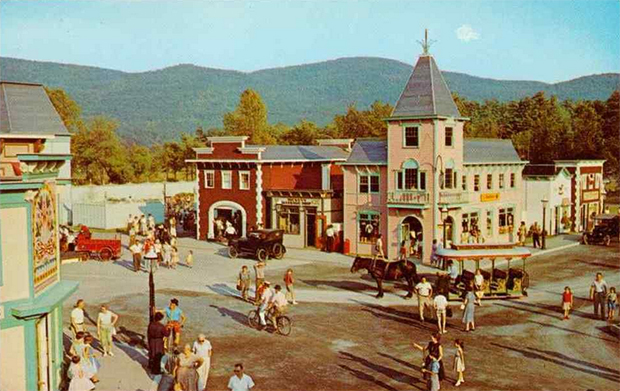
Is that a tennis ball down at the foot of Lolita's bed?
It looks like it could be a tennis ball but I can't tell.
In section one I've discussed the table tennis scene, and then again I've briefly touched on it above in relationship to Humbert's playing with the tennis racket at Camp Climax, and Humbert and Lolita staying in a room that had been originally reserved for Captain Love, the Love referring to the obvious but also to the "love" score for zero in tennis.
In The Shining the appearance of a mysterious tennis ball leads Danny to the open doors of room 237.
November 2014 transferred to html. Originally posted sometime before 2012. Approx 14,200 words or 29 single-spaced pages. A 109 minute read at 130 wpm.
Go to Part 5
Go to Table of Contents of the analysis (and supplemental posts)
Link to the main TOC page for all the analyses